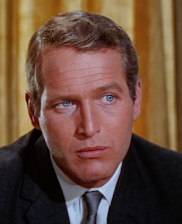 |
Henry Fonda calling his agent after
appearing in Tentacles. |
Kirk Douglas did it. Ditto for Walter Pidgeon. Even John Wayne and Ray Milland got into the act. Yes, we're talking about fighting giant octopuses and squids. So, there's nothing unusual about Henry Fonda, Shelley Winters, and John Huston appearing in a movie about a giant octopus harassing a seaside community. It's just a shame that they had to choose a low-budget, Italian-made horror opus called
Tentacles.
Huston and Winters play brother and sister; he's an investigative reporter and she's a single mother. Huston's writer somehow connects a series of mysterious deaths around Solana Beach with an underground tunnel being built by an industrialist played by Henry Fonda. He's right, of course...Fonda's company's excavations have unleashed a giant octopus that likes to eat people. Have I mentioned that
Tentacles was made two years after
Jaws shattered box office records?
 |
| Shelley Winters makes hats popular again. |
Despite its budget,
Tentacles had the potential to be an entertaining popcorn movie; consider what John Sayles did with
Piranha one year later (and his biggest stars were Kevin McCarthy and Bradford Dillman). Unfortunately,
Tentacles is drenched with cliches, such as: the diving bell that can't be pulled from the water because the mechanism malfunctions (it
always does in these movies); the first-person views of the creature (which lowers special effects costs); murky underwater photography (see SFX budget again); and the regatta that places a bunch of kids in peril (a blatant rip-off from
Jaws). Add one of the worst music scores ever recorded and you've got a clunker.
 |
Huston discussing the squid--no, I mean
octopus!--with Claude Akins. |
Henry Fonda apparently filmed his scenes in one day and never appears onscreen with Huston nor Winters. Huston shows minimal interest in the proceedings and, at one point, calls the title creature a giant squid--after we have clearly established it's an octopus. Shelley Winters fares the best, essentially reprising her character from
The Poseidon Adventure.
There are two reasons to watch
Tentacles. The first is a Fritz Lang-worthy scene near the beginning in which a mother has parked her baby carriage near the shoreline as she crosses the street to talk with a friend. The camera frames the mother in the foreground and the baby carriage (with little Billy inside) in the background. It's a disturbing scene as the viewer waits for a slimy tentacle to snatch little Billy. Cars pass by between mother and child. Then, as a final car cruises by, we see that the baby carriage is now floating on the water. It's an effective sequence and gave me hope (false hope, as you know by now).
 |
Hopkins gives his big speech...to
a killer whale. |
The second memorable scene is a camp classic. Bo Hopkins, who plays a marine biologist whose wife was an octopus victim, prepares to send one of his captive killer whales to destroy the octopus. He gives it the following pep talk:
"I guess you know now why I brought you here. I wanted to tell you more about it, but there've been many people that died... I've lost a loved one. I need your help more now than ever. I remember the times when I was training you--people used to call you killers. They used to call me that on the streets. It doesn't mean nothing. You have more, more love in your heart, more affection than any human being I ever met. But now I...I can't ask anybody else, so I'm asking you to help me kill this octopus. I hope you understand that. I know I'm in your environment. I don't want it this way, but if I release you and you go away, I want you to know I'll understand. All right, enough said. I gotta go now. If you feel anything--you talk to me. Make some noises. I know people'll think we're crazy. Maybe we are...maybe we are...."
If there's a tear running down your cheek, I'm sorry I didn't warn you about the raw emotion of that passage. Honestly, I don't know how Hopkins delivered it with a straight face, but--to his credit--he does. He also went on to carve out a solid acting career, mostly in television series like
Dynasty.
As for Henry Fonda, he weathered follow-ups like
The Swarm and
Rollercoaster to win an Oscar in 1981 for
On Golden Pond. As a director, John Huston was Oscar-nominated for
Prizzi's Honor in 1985. Only Shelley Winters missed out on an opportunity for redemption. Ditto for the giant octopus, too, of course.







 The first--and best--of the 1970s "disaster movies," The Poseidon Adventure has aged well over the years. I sometimes think it gets lumped in with its disaster brethren--The Towering Inferno, Earthquake, etc.--which is a shame, because Poseidon is a superior film that established the formula for those lesser efforts.
The first--and best--of the 1970s "disaster movies," The Poseidon Adventure has aged well over the years. I sometimes think it gets lumped in with its disaster brethren--The Towering Inferno, Earthquake, etc.--which is a shame, because Poseidon is a superior film that established the formula for those lesser efforts.






